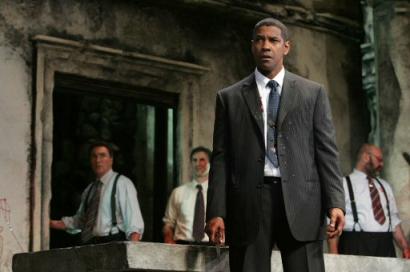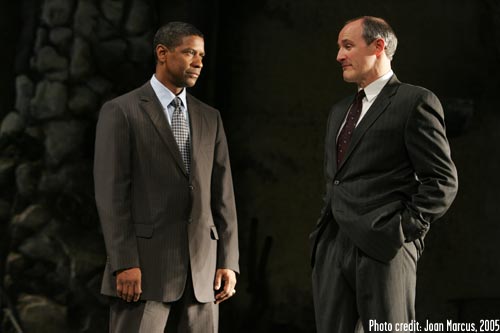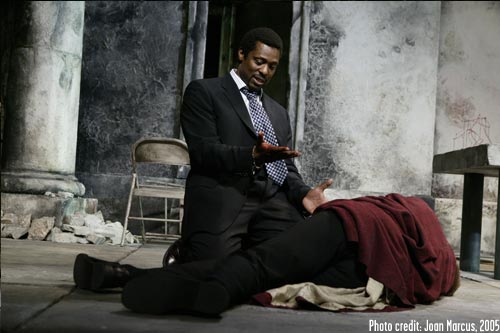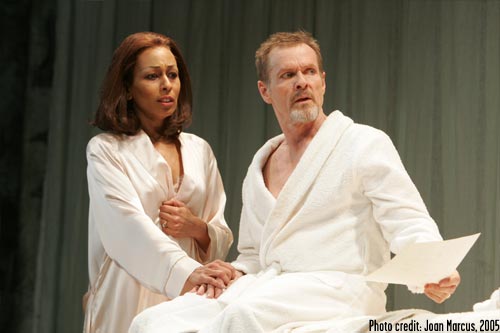“It’s the teenagers who work at the fast food places, and immigrant laborers who come across the border, working in the packing plants, and an executive. It’s kind of from different perspectives. It’s the different sides of the fast food industry.” Richard Linklater discusses his next project, Eric Schlosser’s Fast Food Nation, which may star Maria Full of Grace actress Catalina Sandino Moreno. Sounds a bit like Traffic.
Month: May 2005
The Candyman Can.
Who can take a sunrise, sprinkle it with dew? Willy Wonka opens the factory for public consumption in the new and rather saccharine trailer for Tim Burton’s Charlie and the Chocolate Factory. To quote the man himself, “You’re really weird.”
From Dream to Decency.
By way of Ed Rants, American Rhetoric presents the “100 most significant American political speeches of the 20th century,” many of which are available as downloadable mp3s.
Spotlight on Bolton.
A day after Senator George Voinovich (R-OH) excoriated the pick in print, the Bolton nomination goes before the full Senate. (Alas, despite Voinovich’s letter, the GOP looks likely to fall in line.)
Washington in Rome.
“Why should his name be sounded more than yours? Write them, yours is as fair; Sound them, Yours doth become the tongue as well.” Why? Well, cause he’s a full-fledged movie star, that’s why. Still, despite having a bit of a muttering problem at times, Denzel acquits himself “honorably” as Brutus in Julius Caesar, which I saw last night at the Belasco Theatre. Set in a half-post-apocalyptic, half-Depression-era Rome that evokes anything from Masked & Anonymous to Black Hawk Down, this version of Shakespeare’s classic is innovatively staged and well-worth seeing, but, unfortunately, it also suffers from a stylistic dissonance that hinders the play at its most crucial moments.
The central problem with this production is the clash of acting methods. Many of the actors — and particularly Denzel — underplay their roles to the extreme. In fact, in delivery if not in diction, Denzel’s naturalistic Brutus is only a step or two from most of his other performances, be it Glory, Devil in a Blue Dress, or The Manchurian Candidate. That would be fine, if everyone else was on the same page, and a lot of the other actors are. Jack Willis (at left) deadpans Casca like Cypher from The Matrix, and Patrick Page steals his one major scene (in which he convinces Caesar to report to the Senate on the Ides of March) by portraying Decius Brutus as the worst kind of unctuous DC aide, complete with a leather executive folder in tow and a flatterer’s simper plastered on his face.
Unfortunately, some of the other actors didn’t get the memo. Bill Sadler’s Caesar is prone to acts of grandstanding, but that’s acceptable — he’s Caesar, after all, and bestrides the narrow world like a Colossus. No, the main offender is Colm Feore as Cassius, who plays the lean, hungry Machiavel in full “Master Thespian” mode — at times he’s hammier here than he was in Riddick. I’ll admit, I may be being a bit hard on Feore, as Cassius has always been one of my favorite Shakespearean characters (well, until he gets all weepy and high-maintenance in the second half of the play.) And Feore’s performance might be fine for a different cast of Caesar…but here, he’s just off. If this is Denzel’s Julius Caesar, as everything seems to suggest, Feore’s portrayal of Cassius should have mirrored Denzel’s low-key, understated Brutus. Instead, Feore is overplaying to the hilt, and the contrast is jarring in every scene the two central plotters share.
The Denzel-disconnect causes problems elsewhere, too, notably in the crucial Act III funeral speeches. Eamonn Walker makes a fine Mark Antony throughout, but he just doesn’t have the star wattage or natural charisma of Denzel Washington. As a result, Antony’s manipulative eulogy — the critical hinge moment of the play — seems slightly tepid and uninvolving compared to Brutus’ earlier rousing oratory. It’s possible that I’m just ruined by the James Mason-Marlon Brando version, as there does seem to be some precedent in the play for this take: “I am no orator, as Brutus is…I have neither wit, nor words, nor worth, action, nor utterance, nor the power of speech, to stir men’s blood.” Still, I think there’s a dramatic problem if Brutus’ oration is more of a showstopper than Antony’s. If anything, it seems here that their roles should have been reversed.
Still, despite these grievances, Julius Caesar is a satisfying production for the most part, with some particularly nice visual flourishes throughout. The Escape from New York, Berlin-bunker look of the set seems strange at first, but gains potency as the play darkens — in the “Cinna the poet” mob scene, for example. (Speaking of which, between this and Sith, it’s been a bad week for republics.) And I particularly liked the look of the Senate, even if it was somewhat reminiscent of Liev Schrieber’s EXCOMM war room in the Henry V revival two years ago. (With that in mind, the play gets off a great Homeland Security gag, as the various conspirators have to figure out a way around the Senate metal detector.)
The war scenes of the final acts are also surprisingly kinetic, with Roman forces garbed in guerilla green or black weaving through the hollowed-out set and spouting commands in verse. In fact, while I guess this shouldn’t be a shock given the subject matter, this production of Julius Caesar is also quite grisly — they don’t skimp on the blood and gore, and Sadler’s corpse is frozen in a horrifying Ring-like rictus scream during the Antony speech. (Strangely, this produced nary a shudder in the crowd, while the mere sight of Caesar’s bare posterior earlier on sent the audience into a paroxysm of shocked gasps — the MPAA has screwed up this country something fierce.)
So, in sum, Julius Caesar is a worthy production that makes for a good evening out, but it’s got some issues that keep it from being an all-time classic version of the play. The fault, dear readers, is not in its stars, but in its supporting cast, that they are underlings. In the end, a more balanced production, with either more or less star power, would have probably worked out better.
Big Trouble in Super Hogwarts.
The Incredibles meets Mean Girls in the new trailer for Disney’s Sky High. Looks like it might be a better-than average kid’s movie, particularly with characters like Bruce Campbell and Dave Foley in the mix.
McCain v. Giambi.
In very primary-friendly fashion, John McCain announces a federal anti-steroids bill for all professional sports, to be administered by the US Anti-Doping Agency.
Nuclear Escalation.
Priscilla Owen may be through, but a number of papers note today how Monday’s compromise only sets the stage for an ugly battle over Dubya’s next Supreme Court pick, likely to be a conservative freakshow.
Harnessing Nuclear Power.
I already posted one of these in the comments yesterday, but in case you missed it: Salon and the major papers break down the impact of nuclear detente on the 2008 GOP primaries. I’m dismayed to hear purported maverick Chuck Hagel attack the compromise — between this transparent kowtowing to primary-voting fundies and his Yes vote for John Bolton, the Senator of Nebraska is seeming less and less worthy of moderate support.
Darkness on the Edge of Town.
Twenty-eight years into its tour of the universe, Voyager I reaches the edge of the solar system. “[P]roject scientists, working from models of a phenomenon never before directly observed, finally agreed that data from Voyager 1’s tiny 80-kilobyte computer memory showed that the spacecraft had passed through termination shock to the ‘heliosheath,’ a frontier of unknown thickness that defines the border with interstellar space.“






